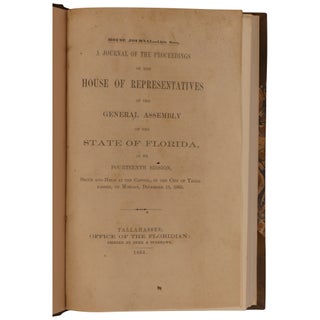Florida's Racist First Post-Civil War Legislature
A Journal of the Proceedings of the House of Representatives of the General Assembly of the State of Florida at Its Fourteenth Session
Notes: The first journal of the Florida House after the Civil War when the legislature began to grapple with Reconstruction and rewriting laws for the formerly enslaved men, women, and children in their midst. Florida's elected officials were unrepentant racists.
David S. Walker, the first post-war elected governor (William Marvin served several months as a provisional governor after the war ended), deserves to be quoted at length as his views reflected those of most White Floridians:
First, he excuses Florida's secession because the North had sent unclear signals about whether it would be allowed. "It is no wonder that our people should have become bewildered," he concludes (p. 32). Then he turns to the formerly enslaved people, spinning the myth of the benevolence of the South's peculiar institution. "For generations past, they have been our faithful, contented and happy slaves... It is not their fault that they are free—they had nothing to do with it... They are no longer our contented and happy slaves, with an abundant supply of food and clothing for themselves and families, and the intelligence of a superior race to look ahead and make all the necessary arrangements for their comfort" (p. 33).
Walker justifies the 3/5th compromise, which counted Black men as 60% of a person for congressional representation as indicative of the natural order: "Our fathers of 1783 knew that it takes five black men to do the work of three white ones, and in adjusting apportionment of taxes upon the basis of labor and industry of the country...recommended that every five blacks be counted as only three" (p. 34).
The governor urges the legislature to ratify the 13th amendment, abolishing slavery, with the argument that it was a pre-condition for Florida to be readmitted to the United States and it will never lead to Black people voting. "Each one of us knows that we could not give either an honest or a conscientious assent to negro suffrage" (p. 41).
Among the many troubling bills considered by the legislature (that Black people were not citizens, the Black people could not testify in court against White people, that agricultural workers should be forced into annual contracts with severe penalties for failing to work the entire term), the most offensive section is a long report about reforms to the judicial system (pp. 58–69) that proposes introducing flogging as an allowed punishment because fining poor Black people would be pointless.
This legislative session opened on December 18, 1865, and concluded on January 16, 1866.
323 pages.
Edition + Condition: Contents generally very good (no separate wrappers, as issued). A few leaves with short marginal tears; one wormhole penetrates the entire book. Bound without the Appendix of documents for the Governor's Message.
Finely bound in three-quarter's leather and marbled paper-covered boards. The spine has raised bands and is stamped in gilt. A truly lovely period-style binding.
Publication: Tallahassee, FL: Office of the Floridian, Printed by Dyke & Sparhawk, 1865 [–1866].
Item No: #308258
Sold


